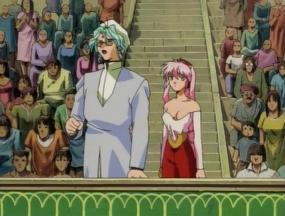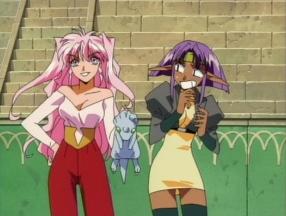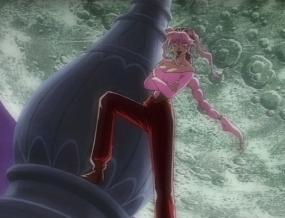|
As
a genre, animé is heavily influenced by the successes
and failures of its past productions. If a sci-fi horror
series gets a lot of viewers, then many more sci-fi horror
series will be made because of it; likewise, if the latest
police drama fails to attract people's attention, it's unlikely
that more police dramas will be produced. The same, of course,
could be said of any genre, but as far as I know, animé
is the only one that seems to go through set "phases" of
similarly-themed series being produced in blocks of four
to five years.
This
time around, we're firmly in the mid-1990s, where medieval
fantasy tales were the order of the day. Series such as
Slayers and OVAs like Dragon Half, set either
in Earth's medieval past or on some other world where sword
and sorcery reigned, became immensely popular – and it wasn't
surprising that even more medieval manga and animé
series cropped up because of them. Gestalt is based
on the manga of the same name, and was made into a two-part
OVA (Original Video Animation; the equivalent of straight-to-video
productions) in 1997. It's only this month turned up on
R2 DVD, after a six-year wait since its English translation.

Gestalt tells a tale that's heavily influenced by Japanese role-playing
computer games (indeed, games production house Enix had
a hand in its development). Father Olivier, a high-ranking
priest, decides one day that he must travel to the forbidden
land of Gestalt – known as "G", since the populace have
taken the Harry Potter turn of never speaking its
name. The head of the church hires a dark elf called Suzu
to bring him back, and she'd normally do the job easily...
were it not for the mysterious Ohri, a young sorceress who
decides to tag along with Olivier on his long journey. In
addition, Ohri has a hidden past and may not be what she
appears – something that nearly everyone on their journey,
save Olivier, can see.
The
pair find themselves in a walled city, where they're forced
to participate in a tournament against resident pretty-boy
Soushi, the evil Queen (who's got a Theoden-like hold over
the King), and their pet monsters – including nasty "carrion
crawlers" and various dragons. Because, of course, you have
to have at least one dragon in every medieval fantasy story
– right? While they're there, Olivier begins to discover
more about both his self-appointed mission to Gestalt, and
about Ohri's true powers.
The
animé is replete with RPG references and in-jokes:
Ohri is initially under a "Silence" spell and talks exclusively
in blue text boxes; the characters cast spells and summon
monsters to do battle; and most RPG players will recognise
the generic "castle town" and "small village" locations
right off the bat. Combat, while obviously not played in
a turn-based game fashion (for the sake of the narrative),
is done with both weapons clashing and magic spells flung
around. In addition to the specific RPG references, there's
a liberal scattering of elements from other famous fantasy
tales, such as the aforementioned Lord of the Rings riff with the King, and the appearance of "dark elves" (a
common archetype in fantasy fiction).

Story-wise,
the series is hampered because of its status as an OVA –
bearing only two episodes, it doesn't have nearly enough
time to do anything other than set out characters and motivations.
I like to think of OVAs as "pilot episodes" that might eventually
become a full series; however, given the age of Gestalt,
I'd say that the possibility of this is slim to none. The
manga upon which it is based obviously goes into far more
detail, but all my sources indicate that it's only available
in Japan and was never translated. Still, the series makes
good use of the time it has, telling a good yet encapsulated
story in a world that – as an avid RPG player – interested
me.
On
the animation front, it's easy to tell the series' age through
looking at the visual styles alone. Bold lines, solid colours
and detailed animals and creatures identify this as a series
produced in the mid- to late-1990s. It doesn't have the
"scratchy colours" common to series like Twin Signal
and Pokémon, which I feel is a good thing.
CG is sparse, only rearing its head when certain spells
are cast. Relating to its accessibility, while the sword
and sorcery setting would clearly appeal to younger viewers,
there are a couple of instances of bloody violence and one
shot of nudity – and the female cast are drawn to the worst
extremes of fanservice animé.
The
music is forgettable and again very typical of the era,
with jaunty melodies and little else. The only piece I took
note of was a raucous violin melody that plays during Part
1. Voice acting goes back to the dark ages of English dubbing;
it's technically sound, with mouth-movements corresponding
to the speech, but hopelessly miscast. Suzu's voice is eardrum-burstingly
screeching, Ohri is just loud, and the supporting cast indulge
in some of the worst scenery-chewing I've ever heard. I
didn't listen to the Japanese vocal track, but I'd reccommend
listening to that – it has to be better than the English
one.
In
conclusion, Gestalt is a humourous take on the medieval
fantasy genre. While it doesn't send itself up as much as
Dragon Half and at least tries to set up an engaging
story, it's clear that the restricted runtime hurts it overall.
With no accompanying English manga to continue the story,
Gestalt could be viewed as a mere curiosity; just
something to pass the time. Reccommended to older viewers,
particularly those who enjoyed the Lord of the Rings
movies.
The
framing is 4:3 and the signs of an NTSC to PAL conversion
are all there – double image freeze frames on action, a
very slight softness to the picture – but otherwise the
transfer is a pleasing one, the colour reproduction and
contrast looking about right. As ever with MVM, there are
not dust marks or damage.

Two
soundtracks are offered, both Dolby 2.0 stereo, on Japanese,
one English. Sonically there is little to choose between
them, although the background music is sometimes a little
louder on the Japanese track. Both are clean and distortion
free.
The
bright yellow English subtitles are very clear throughout.
Extra
features are limited only to an art gallery,
a screenshot gallery, and trailers for Chobits, Fruits Basket and Fullmetal
Alchemist.
|